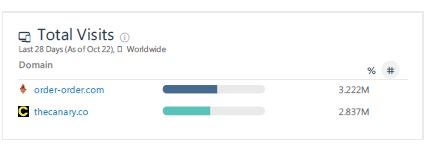
Guido Fawkes editor Paul Staines has praised The Canary’s “extraordinary success” but said that he has regained his traffic lead over the left-leaning site.
According to figures from media analysts Similarweb, shared with Press Gazette, Guido received 3.2m visits over 28 days (as of 22 October) compared with 2.8m total visits for The Canary.
It has taken Guido three months to recapture the top spot, Staines told Press Gazette, saying he had been “shocked” when during the 2016 general election The Canary “nearly tripled” Guido’s web traffic.
Staines said traffic has been boosted by two scoops exposing past inappropriate comments made by Labour MPs Clive Lewis and Jared O’Hara that have made national headlines.
Both men have apologised for their remarks and O’Hara has now been suspended from the Labour Party.

Source: Similarweb
Staines said that of the various left wing news websites that have grown up along with the rise of Jeremy Corbyn’s The Canary was the only one he rated.
“I do see them as the left-wing competition,” he said. “The other specialist websites are more the party-affiliated websites. They are never going to be as punchy by the nature of them, but they do pretty well.”
He said he had been paying attention to The Canary since the last general election and that it had “improved” from a “sort of student, ranty opinion site to a bit more news orientated”.
“Sooner or later they are going to start breaking stories and when they do that and have more of a reportage approach than a news aggregation with a left-wing slant approach, which they mostly have at the moment, then I think they will be a very fierce competitor,” he said.
Staines also praised Canary editor Kerry-Anne Mendoza, who launched the website two years ago on a shoestring budget, saying: “I can’t fault her, she has done a good job and they do know how to write a headline.
“Now they have just got to get some exclusive stories, rather than exclusive takes. Anyone can have an opinion, it’s very hard to have original news though.
“It’s the same critique I have had of political reporting and the lobby system going on 12 years. They all hang out together, they all have group think and half of them are lazy.”
Staines said: “I think the problem for The Canary is they aren’t based in Westminster whereas we are all out and about in the bubble, so to speak.
“Now they may see that as an advantage, but you can’t really break news stories of national import if you aren’t out and about wearing out shoe leather in Westminster.”
While he said it was a “bit rich” of newspapers to pour scorn on the impartiality of The Canary, given their own biases, he said Guido would “never let our political leanings get in the way of a good story, whereas I suspect the Canary would ignore left-wing failings.
“And that’s the difference between the Canary and newspapers too. The Mail would go after a Tory MP and the Guardian would go after a Labour MP without hesitation, whereas I doubt some of those left-wing sites, which are kind of Corbyn fan sites, would do so.”
Staines pointed to Guido’s exposure of Brooks Newmark (the story was sold to the Sunday Mirror) and its campaign against David Ruffley, both former Conservative MPs, saying: “We don’t pull our punches going after the Tories when we feel it is right.”
When it comes to funding, Staines said the Canary’s model of sharing revenue from advertising between its editorial team was “not sustainable” in supporting its journalism and would have to change.
He said Guido’s model was more conventionally commercial, made up principally of advertising and selling stories to newspapers. The latter has dwindled from about half of revenue to between 10 and 20 per cent.
He said native advertising would be the “biggest growth area” for the site in the next couple of years, adding: “We will make more from that than we will selling to newspapers.”
Staines said Guido, which has a three-strong editorial team including Staines, Alex Wickham and Ross Kempsell, is profitable.
On Facebook and Google, which are facing pressure from the news industry (including Press Gazette) to pay more back to news publishers, Staines said he gave the bare minimum to Guido’s Facebook page.
“I don’t want to give my audience to Facebook,” he said.
“I want them to come to us and I believe that if I hand over my readers and content to Mark Zuckerberg he will eventually screw me. He might be being very generous right now, but in the end he is going to get me.”
He said of Google: “I don’t feel they are harming me,” with traffic from the search engine coming via direct searches rather than more generic news searches. Twitter he said was a vital part of political reporting.
Staines also said plans to expand Guido to English-speaking countries abroad are “on ice”.
In a statement to Press Gazette, Canary editor Mendoza said: “Readers of The Canary know they can count on us to champion progressive ideas and challenge those who undermine those values, whatever their position or party.
“We’re pleased that in only our first two years, we’ve broken a number of stories outside the mainstream. For example, we were the first UK media outlet to gain access to whistleblowers in the UK election expenses scandal. This broke a number of new angles in the case, helping prompt public interest and police action.
“We are also launching our Investigative Journalism Fund in the new year. This allows members of The Canary to vote on which investigations we fund, deepening the relationship between our journalists and our readers.”
Email pged@pressgazette.co.uk to point out mistakes, provide story tips or send in a letter for publication on our "Letters Page" blog
